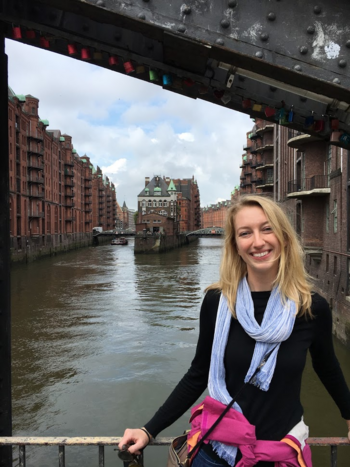Anna Boch (Sociology) | Online hate speech regulation (Hans-Bredow-Institut--Leibniz Institute for Media Research)
Anna Boch (Sociology) | Online hate speech regulation (Hans-Bredow-Institut--Leibniz Institute for Media Research)

I spent nine weeks this past summer of 2019 in Hamburg, Germany at the Hans-Bredow-Institut – Leibniz Institute for Media Research as a Visiting Researcher. This was a productive visit for me, during which I developed a new research project with German and American academic collaborators, submitted two of my dissertation manuscripts for publication in academic journals, and gave a public lecture. On the personal side, I learned a bit of the German language with a tutor and became familiar with Hamburg and northern Germanic culture (NB: I already miss kaffee und kuchen as a cultural institution).
“Online hate speech regulation: Who should decide? A comparative analysis of public opinion in the United States and Germany”
While I was a guest researcher at the Hans-Bredow Institute, I worked with my co-authors to develop a project proposal to submit to funding agencies in the United States and Germany. Being in Germany at a media research institute was incredibly valuable to better understanding other perspectives on hate speech and content regulation. I am working with collaborators who are experts in speech regulation, especially from a legal perspective: Nate Persily, Professor of Political Science and Law at Stanford University and Dr. Matthias Ketteman, LLM, Senior Researcher at the Hans-Bredow Institute in Germany. In the upcoming year, we hope to field the survey, with a potential to extend the survey to other countries. This new comparative project examines public opinion and policy surrounding online speech and institutional trust in Germany and the United States. While Germany bans hate speech – including Holocaust denial – and its citizens generally have high trust in the government, the United States has no legal prohibition on hate speech and its citizens have low trust in the government. With international companies like Facebook making millions of (often automated) content decisions every day, the questions arise as to what kinds of speech people think should be allowed online, and who do they trust to adjudicate difficult cases? Working with academic collaborators in Germany and the United States, this project will offer crucial insight into attitudes regarding hate speech and institutional trust in the digital public sphere.
Germany and the United States represent opposite ends of the spectrum when it comes to legal regulation of hate speech, at least among liberal democracies. Although some 25% of Americans believe that hate speech is illegal, hate speech is generally protected in the United States under the First Amendment unless it contains an immediate incitement to violence. Meanwhile, Germany has a long history of banning hate speech following the end of World War II and the Holocaust, which was catalyzed by hate speech against Jews and Slavs, along with many other groups targeted by the Nazis. However, the emergence of the Internet as a key way that people engage with media and communicate with one another raises questions as to how online speech should be regulated and policed. The vast scale of content uploaded daily and the international scope of most Internet sites urgently raises the questions of which institution(s) are perceived as having the legitimacy to decide what constitutes hate speech and what measures should be taken once it is identified as such.
While contemporary Germans trust their federal government much more than do Americans, Germany’s recent NetzDG law delegates power to for-profit companies to make decisions about unlawful speech, rather than keeping these decisions solely within the judicial system. Meanwhile in the United States, a distrust of government interference in speech has allowed private operators to decide for themselves what kinds of speech to allow, but this laissez-faire attitude is coming under scrutiny from both Republican and Democratic Congressmembers and from within the companies themselves. Thus, this project proposes to answer the questions: in two countries with very different conceptions regarding the relationship between speech and the government, how do ordinary citizens think about the new challenges and opportunities for expression online, how much do they think it – and particularly hate speech – should be regulated, and who do they trust to regulate it? This project will answer these questions using nationally representative surveys comparing Americans’ and Germans’ views on civil liberties, hate speech, and laws about online speech, like the NetzDG law.
Additionally, this new project is very valuable in the context of me going on the academic job market, as it demonstrates that I have future research plans beyond what I have accomplished in my dissertation.
Article submissions and public lecture
In addition to developing the new project outlined above I submitted two of my three dissertation papers for publication in academic journals while in residence at the Hans-Bredow-Institut. Researchers at the Institut offered valuable feedback on these papers before I submitted them, and one has already been given a Revise and Resubmit at Social Problems, a very respected sociology journal. That paper, which deals with political tolerance of extreme speakers at colleges and universities in the United States, was also the subject of a public lecture I gave at the Institut. I would estimate about 25 people attended, including a few students from the University of Hamburg, with which the Institut maintains strong connections. The mostly German audience was really interested in how extreme right speakers coming to speak on mostly residential campuses can feel like a threat to the students’ home on campus, an intrusion to their private sphere, since few German students live “on campus” in the same way. After the lecture, I also recorded a podcast about my work with the communications director of the Institut, and this podcast will be published when my paper is (hopefully!) accepted.
Listen to "Freedom of speech on US college campuses," an interview with Anna Boch and BredowCast host Johanna Sebauer at the Hans-Bredow-Institut--Leibniz Institute for Media Research.
